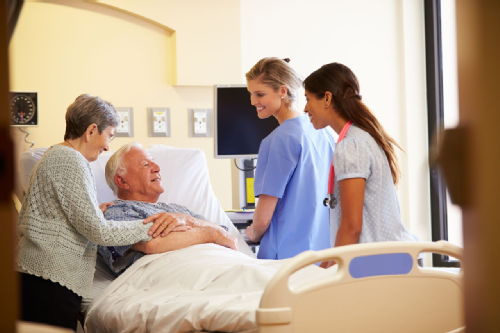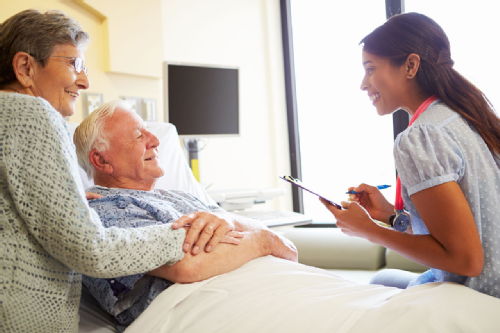All 2 entries tagged Wards
No other Warwick Blogs use the tag Wards on entries | View entries tagged Wards at Technorati | There are no images tagged Wards on this blog
February 12, 2014
Meeting patients
OSCE is done and I'm happy to say it went quite well (I won't get ahead of myself too much yet). I managed to enjoy it even though there were a few hairy moments, so I'm definitely feeling a bit better about the real thing in the summer. Recently we've started seeing real patients in the hospital. So far all of the patients I have met have been so nice, and really keen to help us out, and it feels good to strut around the hospital with your stethoscope around your neck pretending that you know exactly what you're doing. After all, you've got to fake it until you make it, right?

I saw a really nice man last week that came in with shortness of breath. He was happy to have a chat with us and even talked me through my respiratory examination - "I think you're supposed to have a listen now, on both sides of my chest and my back" - at least one of us knew what we were doing. I suppose it's a bit like learning to ride a bike. In the first week we had our clinical tutor guiding us through the history, helping us to ask the right questions, a bit like having stabilisers on. Now we've had them taken off but we're wobbling a bit, still asking what we should do next and how we might make things better in the future. Before we know it we'll be flying solo, bothering patients all on our own.
I really like my tutor and I learn a lot from him. I've also found that a lot of the theory makes much more sense when put into real life, clinical context. Every week though my tutor says "I'll show you this now and you'll never forget". Thankfully, he hasn't remembered that he has had to show me the exact same thing three weeks in a row. He recently tricked us by instructing us to take a history from a man who was completely aphasic and a woman who didn't speak any English at all. I suppose it's all part of the learning curve!
It is quite uplifting meeting people who think that you're an important person and are absolutely entitled to know their deepest, darkest secrets. I'm amazed at how forthcoming patients have been with letting us talk to them, prod them and poke them, even though they have gone through the motions countless times before. People are generous and encouraging. The whole experience definitely fills me with optimism for the future, however naive that may be. I like the idea that one day I can do something to help the people who have helped me to learn. Hopefully though they won't remember that one medical student who palpated them a bit too aggressively or made them sit for ages in the cold without a top on. I hope it has been as positive an experience for them as it has been for me. It can only get better with practice.
See you soon,
Amy
February 10, 2014
The strange things that may go through your mind when you first visit a ward

“Hello, my name is Amritpal Sandhu, and I am a first year medical student”. Before starting Medical School I would have given anything to be able to legitimately use this phrase, but when it first became a reality I felt completely different. I’m not nervous about talking to patients; in fact I look forward to it. Before coming to medical school I had spoken to lots of patients, and even more nerve racking, lots of relatives, and it was always the best part of my day. So why did it all feel different on my first day on the wards?
At Warwick you are put on the wards for half an afternoon every week from the second term. Your experience will vary based on your group (groups of four), your consultant and, of course, the patients you get to see.
My first time on the ward as a medical student was very different to any other experience I have had on a ward. All of a sudden I found myself hyperaware of everything I did and said. For starters there is the stethoscope and what to do with it, something that still causes me quite a stir! Do I put it round my neck and feel like a pretender the whole time and pray no one mistakes me for an actual doctor? Or do I keep this piece of medical equipment out of sight, in my trouser pocket next to my phone, keys and (unused) chewing gum only to go through the ultimate struggle every time I try to extract it? I seriously envy my female colleagues who are savvy enough to carry around a small bag they can use to house this attention grabbing piece of kit, so much so I have even considered trying to bring the bum-bag back into fashion!
Then there was the decision on how to introduce myself to a patient resulting in an internal monologue that that sounded a bit like this: “Do I shake their hand? Do I use their first name or last name? Do I smile? Well, of course I do….don’t I? Wait, they’re ill, you don’t want to seem happy they’re ill! Fine, I’ll smile, but I won’t show too many teeth”. You would think I’ve never worked with patients before!
Finally, once I had gotten over myself and these quite frankly bizarre and distracting thoughts, it was time to sit down next to ‘my’ patient and take a history. For those who don’t know, a history is an interview with a patient where they tell you what has led to them being in hospital. You also need to find out about any other health problems they might have and a whole long list of other important information you need to gather. If you do it right it feels like a conversation between two people, you get it wrong you can feel like you are interrogating someone. It is a juggling act. You want to:
- Make the patient feel comfortable
- Ask all the right questions
- Get all the relevant information
- Make the conversation flow
- Think of questions that will help you eliminate the nastier things
- Try and diagnose the patient whilst you are talking to them
- And, most importantly, listen to what the patient is saying!
Halfway through the first history I took I realised I was too focused on trying to remember what was wrong with the patient that I completely forget their name! Luck was on my side however and it was written in big capital letters above their bed, let this be a lesson, being observant (or lucky, as I was) pays!

All jokes aside, the first time you are on a ward it is pretty surreal, and upon reflection a lot of the pressure I felt was created purely by me. Perhaps it is because it is drilled into us from day one that we are representing the medical profession, a profession that we are still working very hard to become a part of. Or maybe it is because no matter how many times you practice taking a history with your mates nothing can quite replicate what it is actually like with a real patient. It takes a while to realise that patients don’t expect you to know everything and are happy to explain things you don’t understand and are very forgiving when you do forget things. It takes even longer to realise that no one really notices the silly things you will obsess over and you’re not constantly in the way, even though you may feel as though you are.
Although it may sound as though it is pretty scary, as soon as you find your feet it is great fun being on the wards and talking to patients. It is a real privilege to be in the position you find yourself in as a medical student and I cannot wait to enter the clinical phase. I hope to spend a lot more of my time on the wards with patients and a lot less of my time with PowerPoint presentations and flash cards!
 Sarah Hill
Sarah Hill

 Please wait - comments are loading
Please wait - comments are loading
 Loading…
Loading…